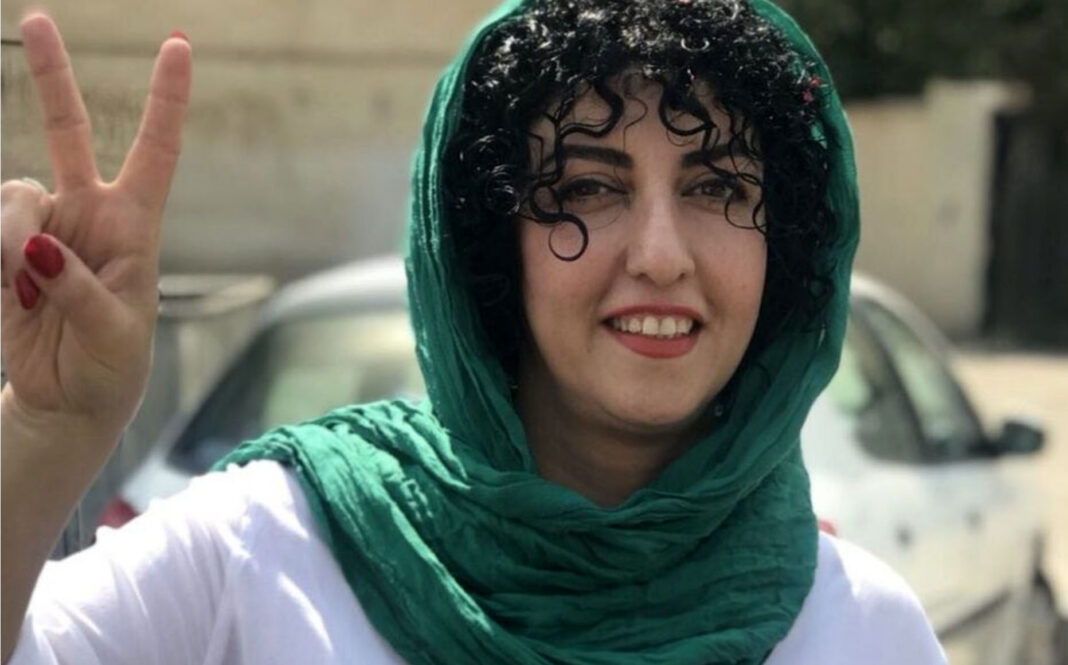Tehran, Iran, October 07: Imprisoned Iranian activist Narges Mohammadi has been honored with the Nobel Peace Prize for her unwavering dedication to championing women’s rights, and democracy, and her staunch opposition to the death penalty in Iran and across the world.
Narges Mohammadi, 51, has persisted in her activism despite facing numerous arrests by Iranian authorities and spending several years behind bars.
She has emerged as a leading figure in the nationwide, women-led protests, ignited by the tragic death of a 22-year-old woman in police custody last year, which have evolved into one of the most significant challenges to Iran’s theocratic government.
Berit Reiss-Andersen, Chair of the Norwegian Nobel Committee, began the announcement with the words “Woman, Life, Freedom” in Farsi, echoing the slogan of the Iranian demonstrations. She emphasized that this award is a recognition of the substantial efforts of the entire movement in Iran, with Narges Mohammadi as its undisputed leader. Reiss-Andersen also called on Iran to release Mohammadi in time for the Nobel Prize ceremony on December 10.
Throughout most of her life, Iran has been governed by a Shiite theocracy under the country’s supreme leader.
Despite women holding jobs, academic positions, and government appointments, their lives remain tightly controlled. Iranian law mandates that women wear a headscarf, or hijab, to cover their hair, making Iran and neighboring Afghanistan the only countries with such a requirement.
In response to the Nobel announcement, Narges Mohammadi stated in a prepared statement, “Surely, the Nobel Peace Prize will make me more resilient, determined, hopeful, and enthusiastic on this path, and it will accelerate my pace.”
Trained as an engineer, Mohammadi has faced imprisonment 13 times and been convicted on five occasions, receiving a total sentence of 31 years in prison. Her most recent incarceration occurred in 2021 when she was detained after attending a memorial for a person killed in nationwide protests. She has been held at Tehran’s notorious Evin Prison, which houses individuals with Western ties and political prisoners.
Narges Mohammadi’s family and supporters expressed their gratitude for the Nobel Prize. Her husband, Taghi Rahmani, living in exile in Paris with their 16-year-old twins, stated, “Every single award will make me more intrepid, more resilient, and braver for realizing human rights, freedom, civil equality, and democracy”.
Rahmani hasn’t seen his wife in 11 years, and their children haven’t seen their mother in seven years.
Their son, Ali Rahmani, emphasized that the Nobel recognition isn’t just for his mother; it’s a tribute to the ongoing struggle of the Iranian population since the Islamic government came to power.
This award marks the 19th time a woman has received the Nobel Peace Prize and the second time for an Iranian woman, following human rights activist Shirin Ebadi in 2003.
While Mohammadi remains detained, the international community hopes that this recognition will further shed light on the situation and lead to her release. United Nations Secretary-General Antonio Guterres hailed the selection as “a tribute to all those women who are fighting for their rights at the risk of their freedom, their health, and even their lives”.
This marks the fifth instance in the Nobel Peace Prize’s 122-year history that it has been awarded to someone in prison or under house arrest. Last year, the top human rights advocate in Belarus, Ales Bialiatski, was among the recipients, and he continues to remain imprisoned.
Mohammadi’s imprisonment stems from her involvement in protests following the death of Mahsa Amini, who was detained by morality police for allegedly violating dress code rules. These protests resulted in over 500 deaths and more than 22,000 arrests.
In the opinion piece contributed from her prison cell to The New York Times in September, Mohammadi wrote, “What the government may not understand is that the more of us they lock up, the stronger we become”.
However, Iran’s government criticized the Nobel Committee’s decision, viewing it as part of Western countries’ “interventionist and anti-Iranian policies”. Iranian state media has described Mohammadi’s activism as “propaganda” and an “act against national security”.
Despite this, within Tehran and beyond, there is widespread support for Narges Mohammadi and her unwavering resilience.






